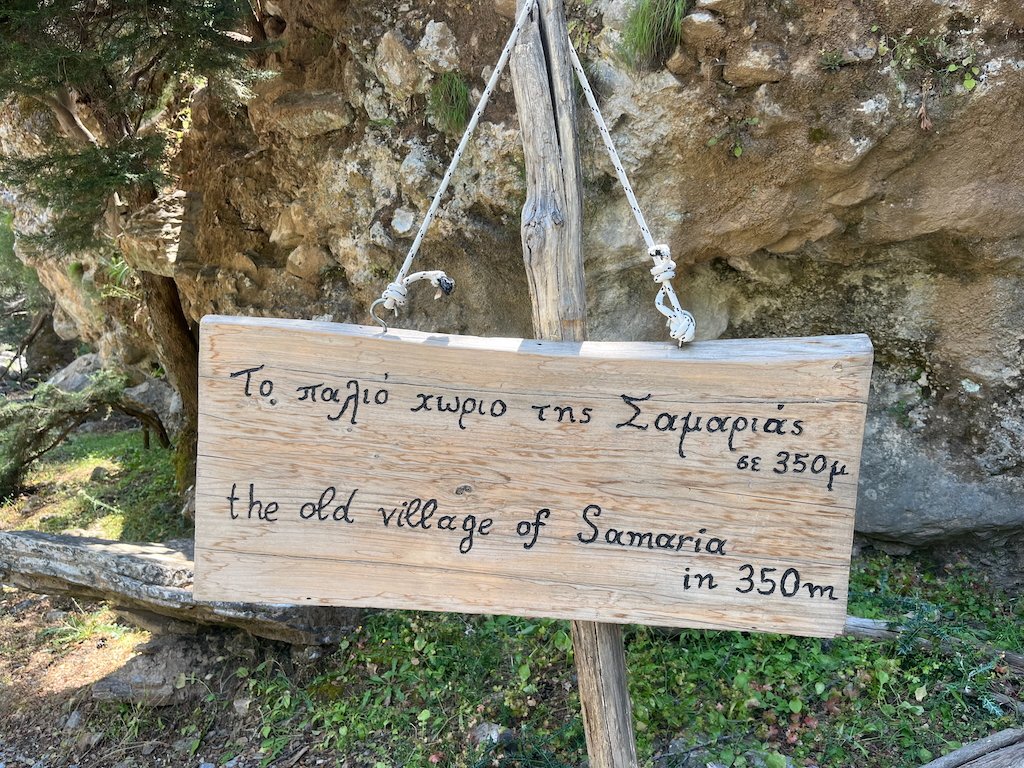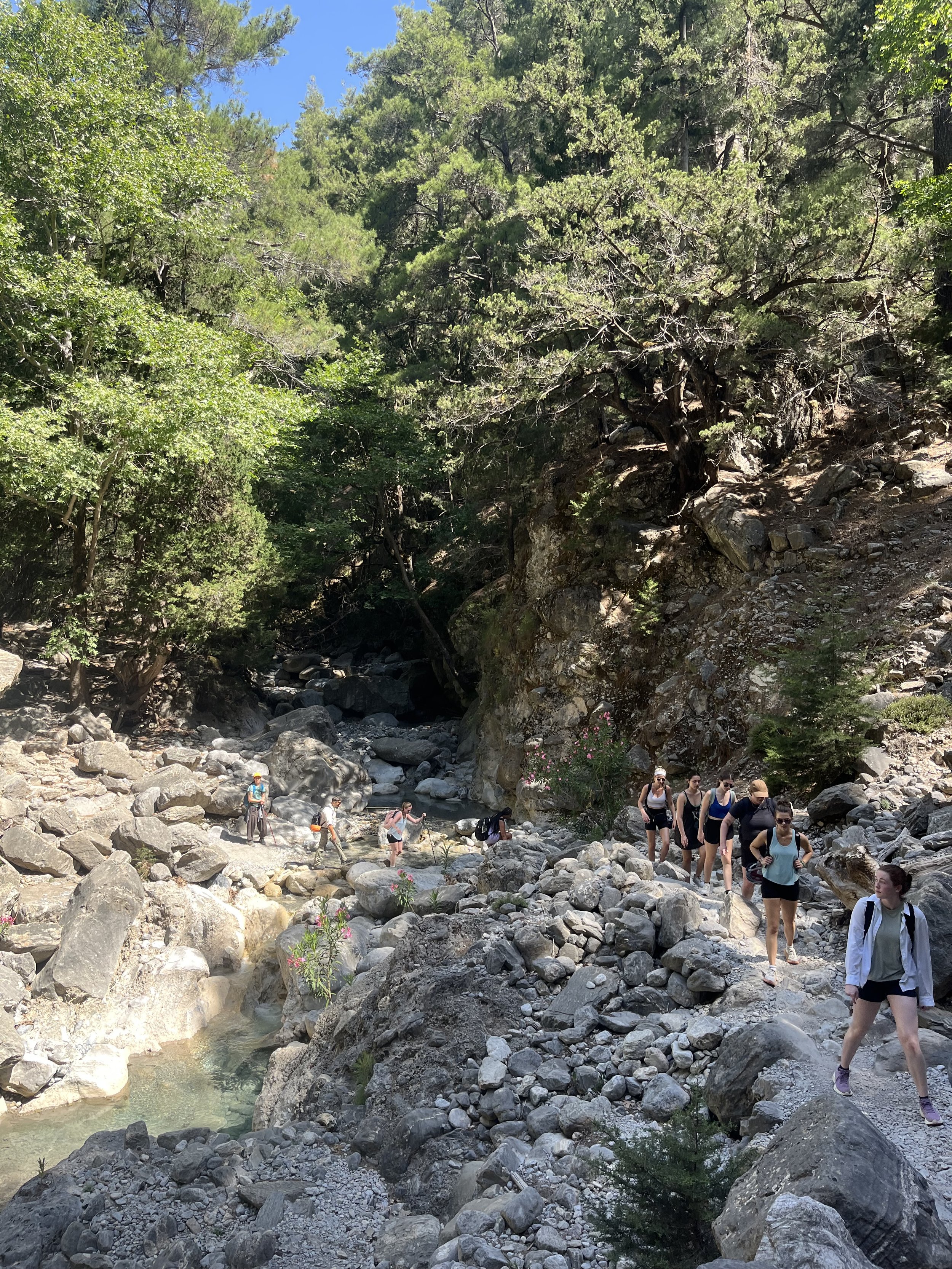What Hiking Samaria Gorge Taught 20 College Students (and Me) About Doing Hard Things, Together
As part of a study abroad course on stress and happiness, we set out to hike Crete’s Samaria Gorge—ten rocky miles with twenty students, most of whom had never hiked before. None of us were fully prepared for how challenging it would be—or how powerful. What began as a physical test became a lesson in resilience, connection, and the surprising strength of doing hard things together.
Entering the gorge—steep, rocky, beautiful. Spirits still high. Feet still fresh.
Before the Hike
When I first saw Samaria Gorge on our itinerary, I wasn’t sure it was a great idea.
Sixteen kilometers—ten miles—through a rocky gorge in Crete, with 20 college students. Half had never been out of the country. Most had never hiked at all. I’m an experienced hiker, so I knew this would be a long day even for me. Still, everything I read said the trail was ‘moderate’ in difficulty, mostly downhill or flat. And if local organizers booked it for a student group, surely it was manageable. Right?
Despite my nerves, I was also excited—because this hike is a UNESCO World Heritage Site that I’d bookmarked in my copy of 100 Hikes of a Lifetime. It felt surreal to be checking it off —and even more meaningful to be doing it alongside students, as part of a program about what makes life feel full and meaningful.
From coffee table dream to real-life blisters. Samaria Gorge, as I first saw it in 100 Hikes of a Lifetime—before I knew how much this hike would teach us.
A Moving Classroom
The hike was woven into a larger co-taught course on stress reduction and the cultivation of happiness. In the days leading up to it, we’d practiced mindfulness, talked about the science of gratitude, and reflected on how time in nature—even just twenty minutes—can lower stress hormones like cortisol. We’d even discussed how movement is part of daily life in Greece in a way that contrasts with the rigid structure of exercise routines in the U.S.
So this wasn’t just a physical challenge. It was a living, breathing classroom.
We arrived on our bus from Chania, and the hike started with some gentle switchbacks that descended into the gorge. Fairly rocky, but nothing too crazy. I could tell that some of the students were feeling pretty unsure of themselves, but it was shady and the views were out of this world. It was enough to keep them all going.
This was our classroom that day. Bigger than any lecture hall, and a lot harder to walk away from.
I made a point of walking with each student during the hike—not just to check on how they were doing physically, but to hear how they were processing the experience.
Several told me how grateful they felt for what their bodies were able to do. Others admitted they weren’t enjoying it in the moment but knew they’d be proud later.
One student said something that stuck with me: that she realized, for the first time, she could be exhausted and frustrated and grateful and amazed all at once. That it was possible to hold all those feelings together. There was something really honest in the way she said it. I could tell it mattered.
“That’s the kind of moment that reminds you why you show up. Why you keep doing this work”
Another student and I talked about her uncertainty about what’s next after graduation. She told me a story I’d shared earlier had stayed with her—how I’d once planned to join the Peace Corps before grad school, and in another version of my life, I might have. The research would still be there. Or it wouldn’t—but something else would. She said that helped her reframe what she wants and reminded her that it’s okay to take a different path. She’s now seriously thinking about traveling before committing to grad school, and even met with a Peace Corps recruiter.
In academia, so much of what we’re told to care about—publications, productivity, prestige—can feel deeply disconnected from what actually matters. It’s easy to get caught up in the idea that your worth is tied to your output.
But hearing that a single conversation made a student stop and think about what would really make her life feel meaningful—that sticks with you. That’s the kind of moment that reminds you why you show up. Why you keep doing this work.
In the middle of the gorge, a reminder: rest matters too. We talked about gratitude here, for stillness and strong legs alike.
We stopped at three rest stops along the way, with lunch at the ruins of the old Samaria Village—where we saw a wild goat scouting out lunch from the leavings of hikers’ snacks.
The trail is incredibly well-maintained. I don’t think I saw a single piece of trash in 10 miles. There are rest stops about every kilometer where you can fill up your water from fountains that pull from the mountain spring and use the restroom.
The squat pad toilets were a new surprise for many of the students.
The quiet ruins of Samaria Village. A pause in the middle of the hike, where wild goats roam and the gorge seems to exhale.
Because we had to reach the ferry at the end, we didn’t have much time to stop and recharge—or just be present—during breaks. This was especially challenging for the students hiking at a slower pace.
The rocky trail forced us to look down much of the time—so being intentional about looking up and around became even more important. I will say, the pace we had to keep took a bit from the experience for me. But I managed to fall back a bit to carve out a little space to walk alone and reflect.
“I don’t take lightly the privilege of standing inside a gorge most people on Earth will never see”
At one point in the hike, I was talking with a few students about how experiences like this fill me with awe.
Not just because of the beauty, but because I recognize how rare it is to see a place like this. I realized again that I push myself to do hard things because I don’t want to miss the wonder that’s waiting.
I don’t take lightly the privilege of standing inside a gorge most people on Earth will never see. And the only reason I got to experience it? I showed up. I kept going.
Somewhere around mile eight. Tired legs, full heart, and no regrets about showing up.
The Final Stretch
I’m not going to lie. The final stretch—the long, exposed road to the sea—was grueling.
There were shuttles at the exit of the National Park that would take you into the town of Agia Roumeli for 2Є.
I would definitely opt for this if I did it again, as the last 2km are all in the sun.
But the first seat at the seaside tavern felt like a gift. And then we did something unforgettable: we swam in the Libyan Sea.
The water was clear and cool, with ancient ruins visible on the hillside behind us. My co-instructor and dear friend who leads these trips didn’t want to get in at first, but I asked her, “When will you ever swim in the Libyan Sea again?” She smiled and joined me.
The beach was rocky and lava hot—I was grateful I’d tossed a pair of flip flops in my pack without really thinking.
As we floated and laughed, we noticed two older women swimming nearby and joked that we hoped that would be us someday—still exploring the world, still jumping in.
I’ll admit, I was too tired and focused on jumping in to snap a photo of the sea once I got there, so this one is courtesy of Adobe. The water really did look this blue.
What We Took Away
During our group reflection the next day, I worried students might say the hike was too hard or not enjoyable.
Instead, the responses were deeply meaningful. Some discovered they loved hiking. Others said it wasn’t for them—but even those students talked about how the support of the group helped them finish and how they were proud.
One student said she had a one-on-one conversation with nearly everyone over the course of the day and another said that this “trauma bonding” (her words) brought the group closer in ways nothing else on the trip had.
That’s what this hike became. Not just a lesson in movement or mindfulness, but in what it means to do hard things—together.
To be reminded that we can carry more than we think. And that when we’re supported, encouraged, and willing to show up even when we’re unsure, we can reach places we never thought possible.
Our Route (As Part of a Study Abroad Tour)
We hiked the full Samaria Gorge — from the high trailhead at Xyloskalo down to the Libyan Sea — as part of a faculty-led study abroad program, accompanied by a certified mountain guide.
Start & Transport: We left Chania by chartered bus at 7:00 a.m., stopping in Omalos village for coffee and fresh-squeezed orange juice before continuing to the trailhead. We began hiking around 8:30 a.m.
Route: Full descent from Xyloskalo (near Omalos) to the coastal village of Agia Roumeli
Distance & Time: Approximately 16 kilometers (10 miles), completed in 5–6 hours with rest and water breaks
Group: College students, faculty, local trip leader, and a licensed mountain guide who offered pacing and support along the way
Terrain: Rocky and uneven, with early switchbacks descending into the gorge, narrow paths between cliff walls, and rocky boulder fields
Footwear Notes: Most students wore regular tennis shoes or sneakers, which worked but made the descent more tiring. Trail runners or hiking boots are strongly recommended for better grip and stability. Hiking sandals or water shoes are very helpful for the swim at the end—the beach is quite rocky.
Water & Supplies:
Natural springs allowed for refilling water along the trail
Essentials included sunscreen, salty snacks, and layers for sun and breezes at the start of the hike
Water shoes and a packed swimsuit made it easy to enjoy a post-hike swim, with tavern restrooms available for changing
Post-Hike Travel: After reaching Agia Roumeli, we took the ferry to Sougia, where our bus met us for the return to Chania
What We’d Tweak Next Time: Taking the optional shuttle after the park exit could have preserved energy and made the day more accessible. The full hike was unforgettable, and student reflections were rich — but a shorter, less demanding alternative hike could have been just as meaningful for a wider range of fitness levels.









